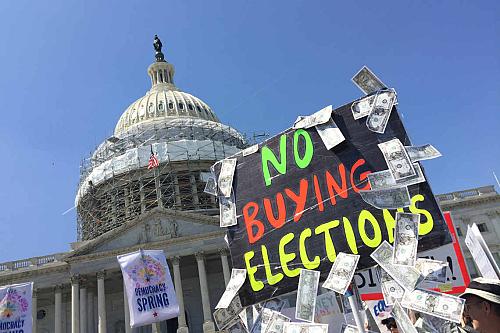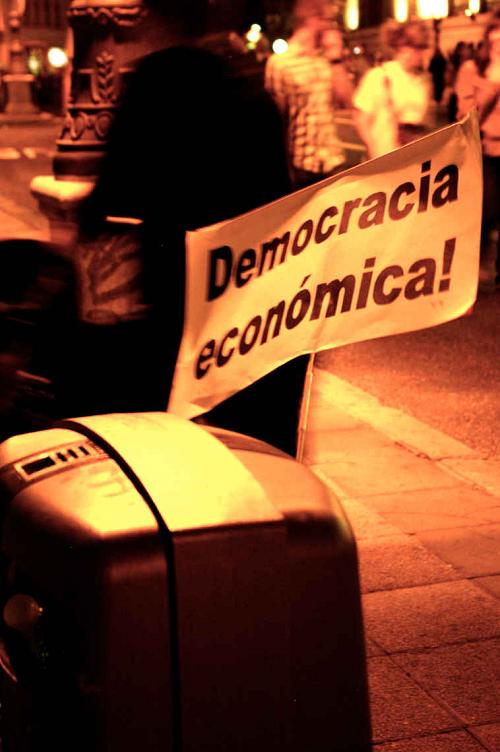Today, the liberal democratic compact appears to be breaking down—democracy, we often hear, is in crisis. Recent research reveals that democracy, defined by the preceding attributes, has weakened worldwide over the last decade or so. According to the 2018 Freedom House annual report, “seventy-one countries suffered net declines in political rights and civil liberties” in 2017, leading to an overall decrease in global freedom. During the Covid-19 pandemic, they found that the conditions of democracy and human rights had deteriorated in eighty countries including Belarus, Egypt, France, Sri Lanka, the United States, Uganda and many more – “exacerbating the 14 years of consecutive decline in freedom” worldwide.
Democracy, however, doesn’t retreat either of its own accord or by some organic or immutable process. It is undermined, attacked, or allowed to wither. It falls into disrepair and disrepute, thanks to the action or inaction of human beings who have lost touch with or, in some cases, sabotaged the tenets, responsibilities, and possibilities that a system of self-government entails.
In order to determine what a progressive agenda to repair and revitalize democracy should be, we need to understand what has gone awry. Unfortunately, conventional narratives too often get things wrong. Consider, for example, the common refrain that “populism” is to blame for our current predicament. We live in a “populist moment,” pundits including Yascha Mounk tell us, and Brexit, the rise of ethno-nationalist movements and parties in Europe, India, and Brazil, and the United States lend credence to this view.
Under this view, the crisis of democracy is caused, in effect, by an excess of democracy. Such was the premise of a piece published in New York magazine in 2016 by Andrew Sullivan, who argued that “hyperdemocratic” society was eroding vital “barriers between the popular will and the exercise of power.” Regular people, we are told, can’t be trusted to appreciate and protect democratic principles and procedures.
Progressives need to push back against this explanatory framework. In contrast to what Alexis de Tocqueville long ago dubbed the “tyranny of the majority,” the threat today comes from a tyrannical minority. Hard-won democratic reforms are being eroded by an entitled, affluent elite, who are doing their utmost to stymie progressive reforms and suppress broadly shared democratic sentiments.
This is a global predicament. In the last few years, citizens all across Europe organize to take their governments to court for their lack of actions before the climate emergency. In Peru, during the massive protests of November 2020, young people were demanding the overthrow of the Fujimori-era Constitution, which strongly limits the ability of the state to take action in strategic sectors of the economy. In the United States, research shows that liberal positions on everything from labor unions to gun control to public health care to the climate catastrophe and the Green New Deal are held by the majority of Americans—with positions generally pushing further left the younger the demographic polled.

And yet, time and again, the will of the progressive majority subverted. As studies in the US show, the agenda is set by oligarchs and well-organized special interests. The rest of us have virtually no impact on public policy.
Liberal democracy is in crisis not because the masses have suddenly become illiberal, as some claim, but because economic elites have abandoned any pretense of concern for the common good. This is the true crisis of democracy, and it is a problem with deep roots. The inequalities that plague us today are not an aberration or the result of whichever party happens to be in power but a logical consequence of our political systems’ initial design, which aimed to benefit a privileged minority. If democracy is to survive and thrive, global foundational inequities, between and within countries, must finally be redressed.
To do that, we must be clear: The primary threat facing democracy today is not one of populism but rather plutocracy. The solution involves putting equality—political and economic equality—at the center of the democratic project.
Over the course of human history, democracy sprung up in all sorts of places and times, taking a variety of forms: citizen assemblies in the ancient Middle Eastern city of Nippur, the Mesoamerican collective republic of Tlaxcalla, African village councils, the Icelandic Althing, Swiss cantons, and so on. The ancient Greeks, in other words, did not invent the practice of democracy, but they did give us the word we use today, one made up of two component parts: demos and kratos. The people hold power.
In the fifth century B.C., the celebrated Athenian statesman Pericles famously praised the political structure of Athens: “It is true that we are called a democracy, for the administration is in the hands of the many and not of the few.” Given the existence of slavery and the exclusion of women, Athens failed to meet the bar by modern standards. Yet, as Plato and Aristotle noted, the overwhelming majority of people who made up the Athenian demos were not wealthy. Rule of the people, they observed, by definition means rule of the poor, since citizens of modest means are bound to vastly outnumber the rich.
This basic insight has been negated in our time as neoliberal capitalism and the massive financial inequities it creates dismantle hard-won democratic gains. As historian Quinn Slobodian has shown, one of the primary goals of neoliberalism is to insulate economic matters and financial decision-makers from democratic accountability, to cleave economics from politics. The result has been a system where markets, not people, rule, and where a lucky few amass almost unfathomable affluence.
According to Oxfam, the 26 richest people on earth in 2018 had the same net worth as the poorest half of the world’s population, some 3.8 billion people. Year upon year, the vast majority of the income generated globally flows into the pockets of the top 1 percent of the world’s population, while the incomes of ordinary citizens have remained stagnant.
If the last fifty years have demonstrated anything, it is that formal political equality, exemplified by the right to vote, is not enough to ensure democracy, as the wealthy have many avenues to exert disproportionate power within an ostensibly democratic system. Under a legal order where money qualifies as speech in the context of campaign spending and lobbying, the richest are able to purchase influence while everyone else struggles to be heard. In a system where the affluent can pass their assets to their offspring virtually untaxed, inherited wealth ensures the creation of an aristocratic class.
The single most urgent and overarching priority of any progressive democratic
agenda must be to address this conundrum. While earlier generations focused
on expanding suffrage, today we face an arguably more formidable task: saving
democracy from capitalism. Extending democracy from the political to the economic sphere is the great challenge of our age, and also the only way to protect our current system of representative government from the concentrated financial power that is proving to be its undoing.
Political equality buttressed by economic equality must be the basis of any truly democratic system. The Greeks, for all their shortcomings, understood this basic fact, and they employed a variety of ingenious strategies to prevent wealthy individuals from dominating their poorer counterparts.
For example, it was illegal to profit from politics in Athens. Going further still, poor citizens were actually paid to participate in public affairs, receiving a day’s wage for attendance at the Assembly, so farmers and artisans could afford to leave their fields and workshops and deliberate alongside the well-to-do.
Even more creatively, Athenians employed sortition—the random selection of citizens through lottery—for key roles in the city’s administration, because they observed, rightfully, that the rich and well-born tended to win elections. (Elections are aristocratic, Aristotle famously observed, lottery democratic.) For the Greeks, democracy meant to govern and be governed in turn. Thus, working citizens had to have meaningful opportunities to get involved in civic life, and that meant accounting for and addressing underlying material inequalities.
If Athenians somehow came back and saw what our modern democracies look like, they would be aghast that the political class tend to be made of millionaires, who go back and forth between public office and private companies, while their constituents largely struggle to make ends meet. They would scoff at the idea that elections are widely regarded as democracy’s apex, and would be dismayed that such a limited conception of democracy is guiding us today.

Without a doubt, this is an age of intersecting emergencies: racism and xenophobia, precarity and poverty, workplace discrimination, unaffordable housing, unaccountable corporate power, mass incarceration, mounting student debt, mass extinction, and rising sea levels—the list goes on. In one way or another, all these issues relate back to the fact that we do not live in a system where democratic popular will can be translated into policy change that is efficiently and effectively implemented.
To have any hope of addressing this disconnect, we need an agenda that connects the political and economic spheres and a strategy for building popular power. We must seek to democratize our electoral system and economy, and by doing so loosen the grip of monied elites and corporate interests on our lives and futures.
On the electoral front, we can take inspiration from the past. Like the ancient Athenians, we must work to protect our democratic processes from the corrosive impact of concentrated wealth.
On the economic front, reducing inequality must be a priority. We should do this by implementing a maximum wage. In Switzerland, the popular initiative “1:12 - Pour des salaires équitables” was pushed by leftists in 2013, demanding that within a company the highest wage couldn’t be higher than 12 times the lowest wage. Although it was rejected then, the idea is worth taking up. “Abolish billionaires” has become a political slogan among young lefties; it would also be smart policy.
Closing the obscene gulf between the rich and the poor, however, is only the first step. We must also address issues of ownership and investment. Working people, not just the wealthy, should have a stake in the companies that employ them, and everyone should have a voice in determining investment. Indeed, that is the only way to rationally allocate capital.
Right now, corporate CEOs and shareholders are determined to prioritize the extraction of ecosystem-destroying fossil fuels or the creation of advertising-driven, privacy-violating digital platforms, even if they have devastating implications for the environment and for public discourse. Democratizing the economy—giving workers and the public as a whole more of a say—would mean we could invest in the things we all need, like solar energy and investigative journalism, not just the things that make a handful of people rich.
The task ahead is urgent. We need to roll back half a century of neoliberal austerity and restore the democratic rights that have been undermined. But we must also reimagine democracy itself—setting our sights on a more robust, inclusive, and egalitarian system than has ever existed.
A growing number of people are doing just that. Since 2019, impassioned social movements have rallied against authoritarianism and exploitation: the Hirak in Algeria, the Primera Linea in Chile, the Umbrella Movement in Hong Kong, Black Lives Matter in the United States, the Gilets Jaunes in France, the list goes on. The global demand and agitation for economic justice and more democratic processes have been on the rise globally. The phrase democratic socialism is emerging as the name for this new political horizon. Remarkably, in the US, the country that brought the world Coca-Cola, Walmart, and Facebook, a majority of young people report preferring socialism to capitalism. Putting their ideals into action, socialists are winning office across the country.
This emerging insurgency is democracy’s best hope. Only by building mass social movements and grassroots-powered electoral campaigns, locally and nationally, will we have any hope of advancing a democratic agenda that lives up to its name—that is to say, a society in which the people, not the plutocrats, rule.
